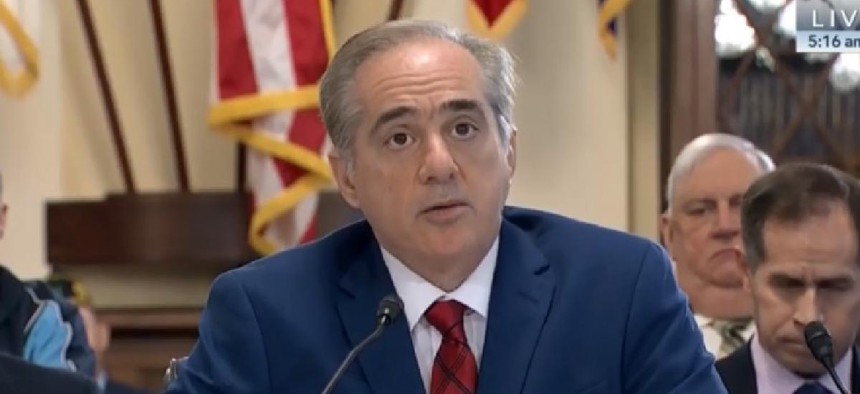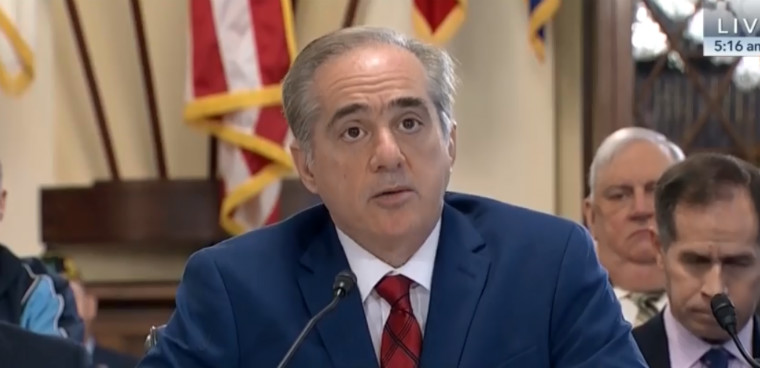VA to dump Vista for DOD's electronic health record system

Citing an urgent need, Secretary David Shulkin announced that the Department of Veterans Affairs would bypass open competition and buy into the solution chosen by the Defense Department in 2015.

VA Secretary David Shulkin announced plans to shift the agency to the commercial electronic health record system recently acquired by the Department of Defense.
The Department of Veterans Affairs plans to drop its homegrown electronic health record system Vista, in favor of a commercial solution used by the Department of Defense.
Secretary of Veterans Affairs David Shulkin announced the move June 5.
"VA's adoption of the same EHR system as DOD will ultimately result in all patient data residing in one common system and enable seamless care between the departments without the manual and electronic exchange and reconciliation of data between two separate systems," Shulkin said.
Shulkin is making the move without market competition, citing the urgency of the matter. Shulkin signed a "Determinations and Findings" document allowing VA to acquire the MHS Genesis system from Cerner on a sole-source basis.
"This D&F action is only done in particular circumstances when the public interest demands it, and that’s clearly the case here. Once again, for the reasons of the health and protection of our veterans, I have decided that we can't wait years, as DoD did in its EHR acquisition process, to get our next generation EHR in place," Shulkin said.
President Donald Trump hailed the move at a White House event touting the administration's infrastructure plans.
"This is one of the biggest wins for our veterans in decades. And I congratulate Secretary Shulkin for making this very, very important decision," Trump said.
Shulkin told reporters VA would get the money to acquire and implement the new system and that it would affect the timing of the rollout of the medical scheduling tools currently being tested by VA. Shulkin has long pledged to the get the department out of the software development business, and had set a July 1 deadline for making a decision about the future of VA's health records system.
There's no word on what a new system will cost VA. DOD's contract with Cerner and integrator Leidos is for $4.3 billion over 10 years, although that amount could go up as DOD's needs change and as they seek to add new features. One year into the contract, for example, DOD agreed to a $73.7 million sole-source add-on for just a single year of data hosting by Cerner.
Shulkin has previously said he planned to seek funds from Congress once the VA made a decision between acquiring a commercial off-the-shelf product or finding a commercial provider to maintain a single instance of the Vista code in a cloud-based system.
"I think it's the right decision," former VA CIO Roger Baker told FCW. "But the main thing they've got to do is implement exactly what DOD implemented, otherwise you don't get the interoperability that's the prime mover for the decision."
Baker was CIO at VA when the Obama administration floated a plan to have DOD and VA collaborate on acquiring a commercial electronic health record. That bid eventually was abandoned, leaving VA to continue with Vista and DOD to go it alone in the market.
If the VA puts in place a uniform clinical workflow similar to what the Military Health System did in preparation of going to a commercial system, it's going to mean big changes for care providers.
"For 40 years, doctors at VA have had the ability to customize the software to local needs. That's why Vista is the way it is," Baker said. "That is a massive culture change in the second-largest organization in the federal government. Nobody should minimize the impact of that."
Shulkin sought to assure VA practitioners by noting that the VA "has unique needs" different from DOD's, and that "VA will not simply be adopting the identical [health record] that DOD uses, but we intend to be on a similar Cerner platform." He added that clinicians "will be very involved" in the implementation of the new system and that VA wouldn't "discard our past work" when it comes to clinical IT innovation.
David A. Norley, a spokesperson for the Defense Healthcare Management System, which is overseeing the implementation of MHS Genesis, welcomed the VA's decision.
"MHS Genesis is a smart thing for VA and also I think it is the best thing for the veteran," Norley said. He added that he understood "there will be one configuration of instantiation of MHS Genesis," which would include not just VA and DOD data, but data from across the Cerner client base. He also said that VA's adoption of the system would not have an impact on DOD's schedule to complete its initial operating capability by the fall of 2018 and to field the system throughout DOD by 2022.
While VA is planning to sunset the Vista health record, Baker noted that the system is not going away anytime soon. The MUMPS-based Vista architecture supports procurement, scheduling, inventory and other business systems at VA.
"Vista is going to have to exist side by side with the new record in my estimation for 10 years. That's how long it's going to take to roll the new record all the way through," he said. "And there are so many things that an electronic health record doesn't do that Vista does, that they're going to have to keep those modules working or replace them with commercial software."
NEXT STORY: Prudence over panic



